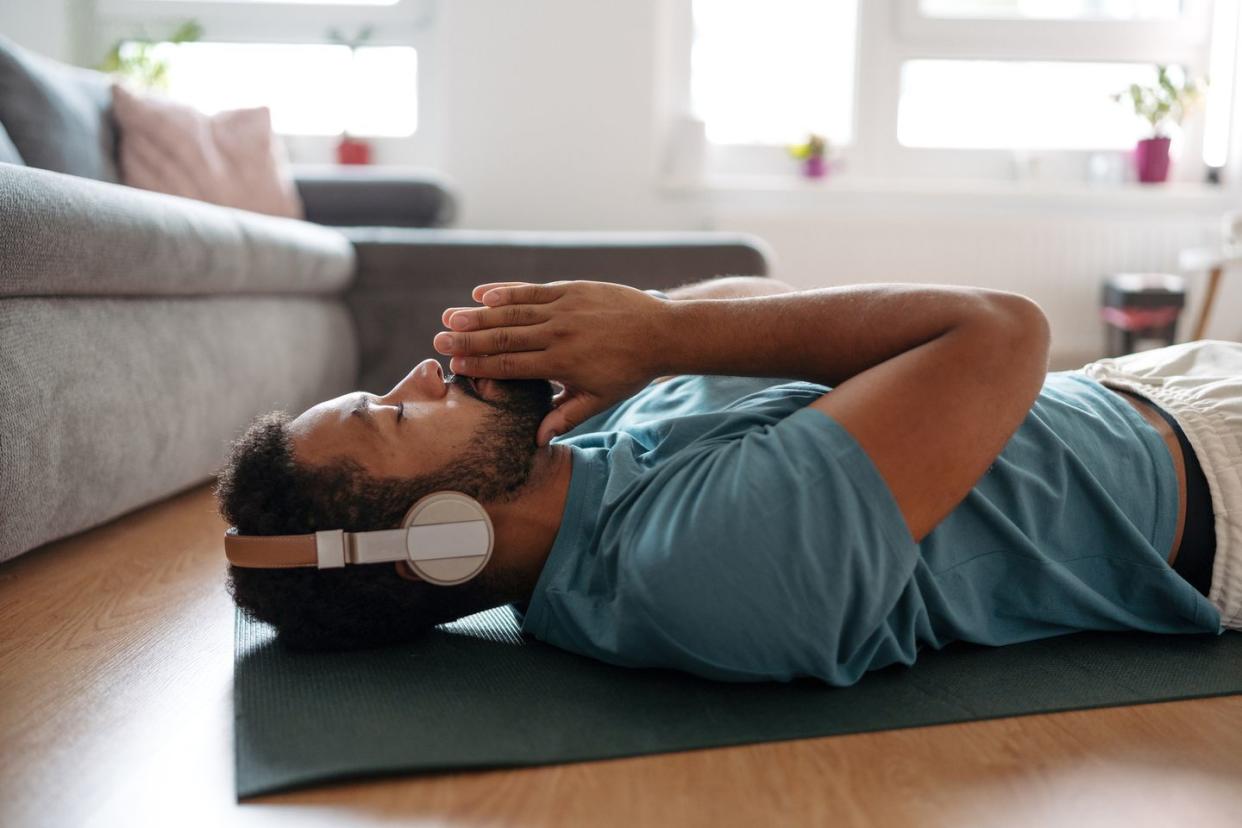4 Benefits of 4-7-8 Breathing, According to Doctors

TAKE A DEEP BREATH. That’s good advice for when you feel overwhelmed, stressed, or anxious. It helps you center yourself and relax. Ad taking it a step further to focus on a pattern of inhaling and exhaling could heighten the calming effects.
The 4-7-8 breathing exercise is one technique that can cultivate “body, soul, spirit connections,” says Kianoush Sheykholeslami, M.D., F.A.C.S., chief of ENT and head and neck surgery at Saint Peter’s University Hospital. “Doing certain exercises with the rhythm, rate, and duration of your breathing” relaxes your body.
Basically, it involves inhaling through your nose for four counts, holding that breath for seven counts, and exhaling through your mouth for eight counts.
4-7-8 breathing can help release stress and calm your anxiety, Dr. Sheykholeslami says. The technique has also been shown to help you doze off if you struggle to fall asleep and improve your quality of sleep.
“When you’re stressed out, you want to take your brain off that stressor,” he says. “It brings your attention to your breathing.”
The breathing exercise is based on a yoga principle called pranayama breathing, or slow exhale, explains Alex Dimitriu, M.D., a double board-certified physician in sleep medicine and psychiatry and founder of Menlo Park Psychiatry and Sleep Medicine. It’s become more popular recently, but integrative medicine expert Andrew Weil, M.D. has been teaching the method for decades.
While experts say 4-7-8 breathing brings many benefits, it can take a little practice to perfect. Here’s exactly how to do it, how it can improve your stress levels, and tips for getting the most out of the technique.
What is 4-7-8 breathing—and, how to do it?
You can do 4-7-8 breathing anywhere and in any position, according to Dr. Weil. But he suggests sitting with your back straight until you get the hang of it.

Place the tip of your tongue on the tissue behind your top teeth and keep it there as you do the breathing exercise, he suggests. Next, follow these steps:
Exhale fully through your mouth, making a whoosh sound
Inhale quietly through your nose with your mouth closed for a count of four seconds
Hold your breath for a count of seven
Exhale through your mouth, making a whoosh sound again, for a count of eight
This is one cycle. “It is advised to do at least four cycles of this type of breathing per round, and it can be done several times a day, as well as before sleep,” Dr. Dimitriu says. As you practice it more, you can do it for up to eight cycles.
How often you do 4-7-8 breathing and when you do it is up to you. People often use the breathing pattern just before bedtime or a nap to help them fall asleep, Dr. Sheykholeslami says.
It could also be used to relax throughout the day, as a kind of meditation. If you go that route, he suggests finding a quiet place to practice the breathing.
The Benefits of 4-7-8 Breathing
Taking steps to reduce stress and sleep better is good for your overall health. Here are some of the main benefits of 4-7-8 breathing:
It has a calming effect.
When you’re upset or overwhelmed, it can be tough to focus. Dr. Sheykholeslami says 4-7-8 breathing can help you distract yourself, calm down, and let go of the stress. Incorporating it into your daily routine gives you an effective coping strategy when stressors arise.

It reduces stress and anxiety.
The body goes into fight-or-flight mode when you’re stressed, which triggers the release of cortisol, also known as the stress hormone. Focusing on your breathing, such as the 4-7-8 technique, releases subcortical hormones, which Dr. Sheykholeslami says can have an “anti-cortisol effect.”
“It relaxes your brain and relaxes your body,” he adds.
Research shows that 4-7-8 breathing may be beneficial in reducing anxiety for people after they had bariatric surgery and improving their quality of life, Dr. Dimitriu says.
It helps you sleep.
Most people don’t get enough sleep or sleep well, Dr. Sheykholeslami says. It’s often because they don’t practice good “sleep hygiene,” he says, meaning they stare at their phones right before falling asleep, their bedrooms aren’t at a comfortable temperature, or they don’t have a relaxing bedtime routine.
Practicing a few rounds of 4-7-8 breathing before falling asleep can reduce anxiety and calm your mind, helping you drift off, says Dr. Sheykholeslami, who recommends 4-7-8 breathing to his patients.
A 2022 study published in Physiological Reports found that 4-7-8 breathing helped lower blood pressure and heart rates for people with and without sleep deprivation. That’s crucial, as lack of sleep can increase your risk for high blood pressure, which can also affect sleep.
It helps you control stress long term.
Learning to relax your body on cue is an effective way to manage stress. Once you get into the habit of regularly practicing 4-7-8 breathing, even when you’re not stressed, Dr. Sheykholeslami says you “could control your mind better.” In other words, you train your nervous system to better respond to its fight-or-flight response, according to the Cleveland Clinic. Then, the breathing technique becomes a natural part of your stress response that you automatically turn to when stressors come up.
Are there any downsides to 4-7-8 breathing?
There are really no drawbacks to 4-7-8 breathing, Dr. Sheykholeslami says. You just have to devote time and energy to practicing it, which could take time.
However, some people might experience lightheadedness when they first start, he says. Holding your breath for seven seconds causes carbon dioxide to build up, and some people might feel a little dizzy as a result. Usually, this effect will go away once you practice the breathing exercise more.
If you have cardiovascular disease or respiratory problems, it’s best to talk to your doctor before trying 4-7-8 breathing, just to be safe.
How to Get the Most Out of 4-7-8 Breathing
The more you practice 4-7-8 breathing, the more of a habit it'll become, and you’ll keep seeing the benefits.
The technique works best when it’s incorporated into a healthy lifestyle that includes healthy eating, exercising, limiting alcohol, and getting enough sleep, Dr. Sheykholeslami says. You can also combine it with other meditation practices.
“It becomes a powerful tool,” he says.
You Might Also Like
